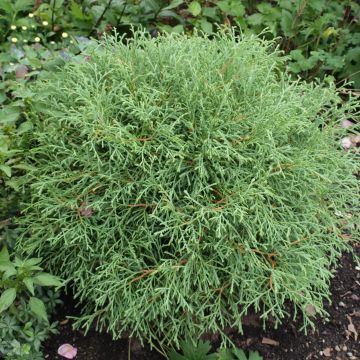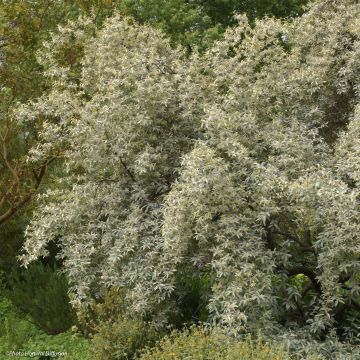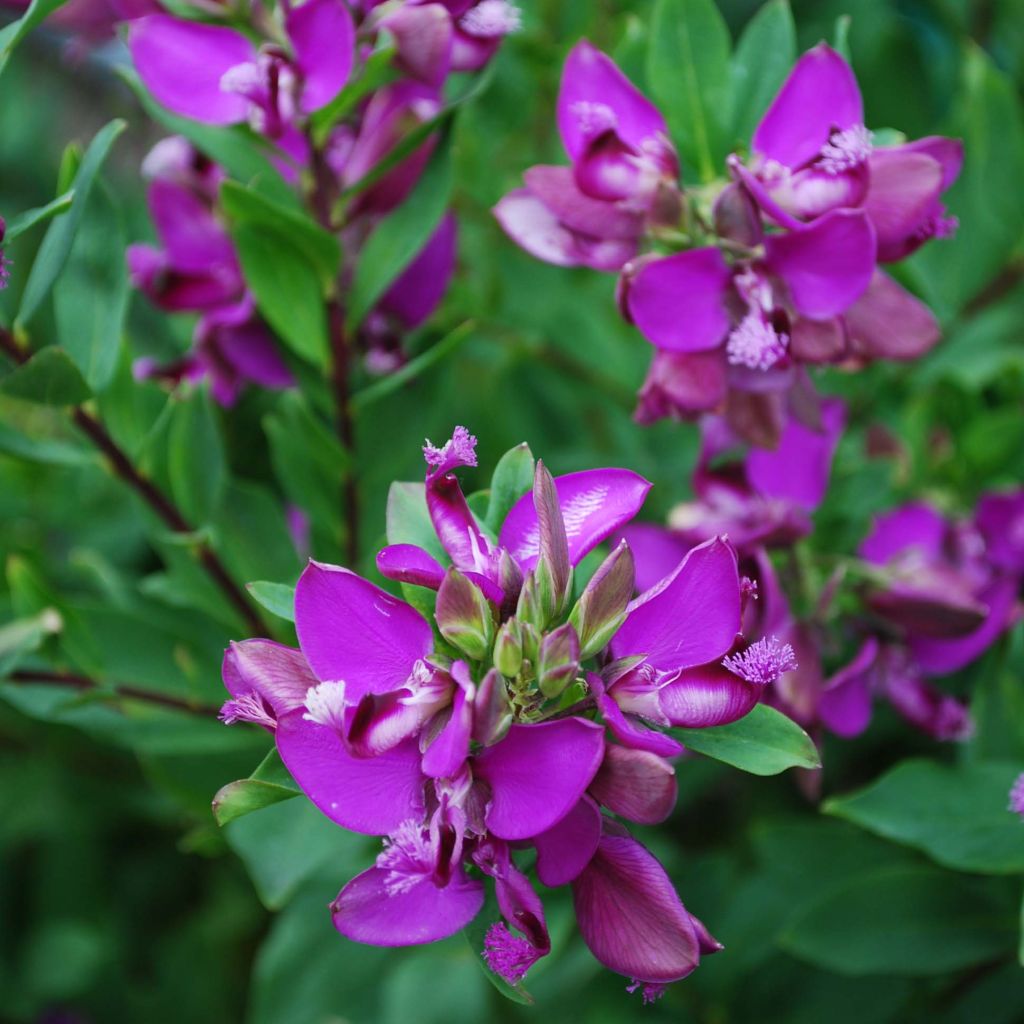

Polygala myrtifolia
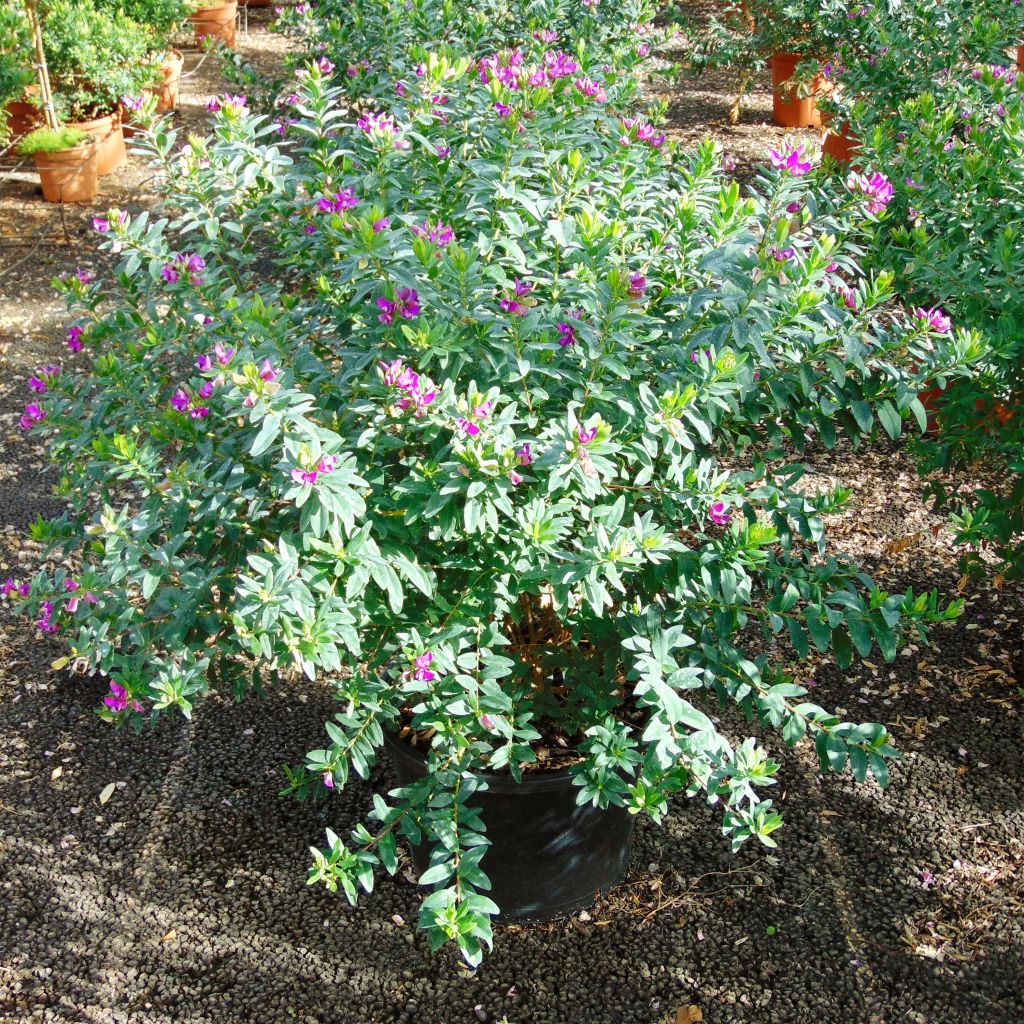

Polygala myrtifolia
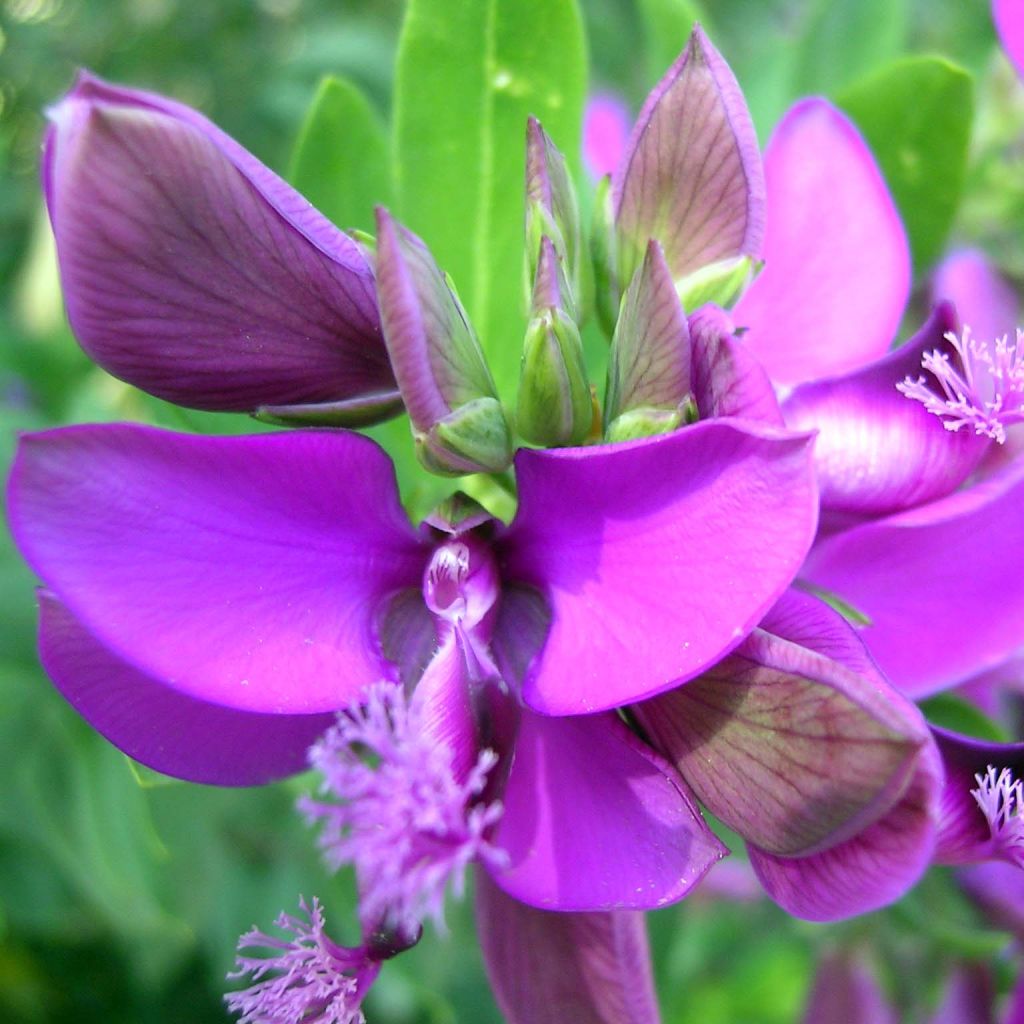

Polygala myrtifolia
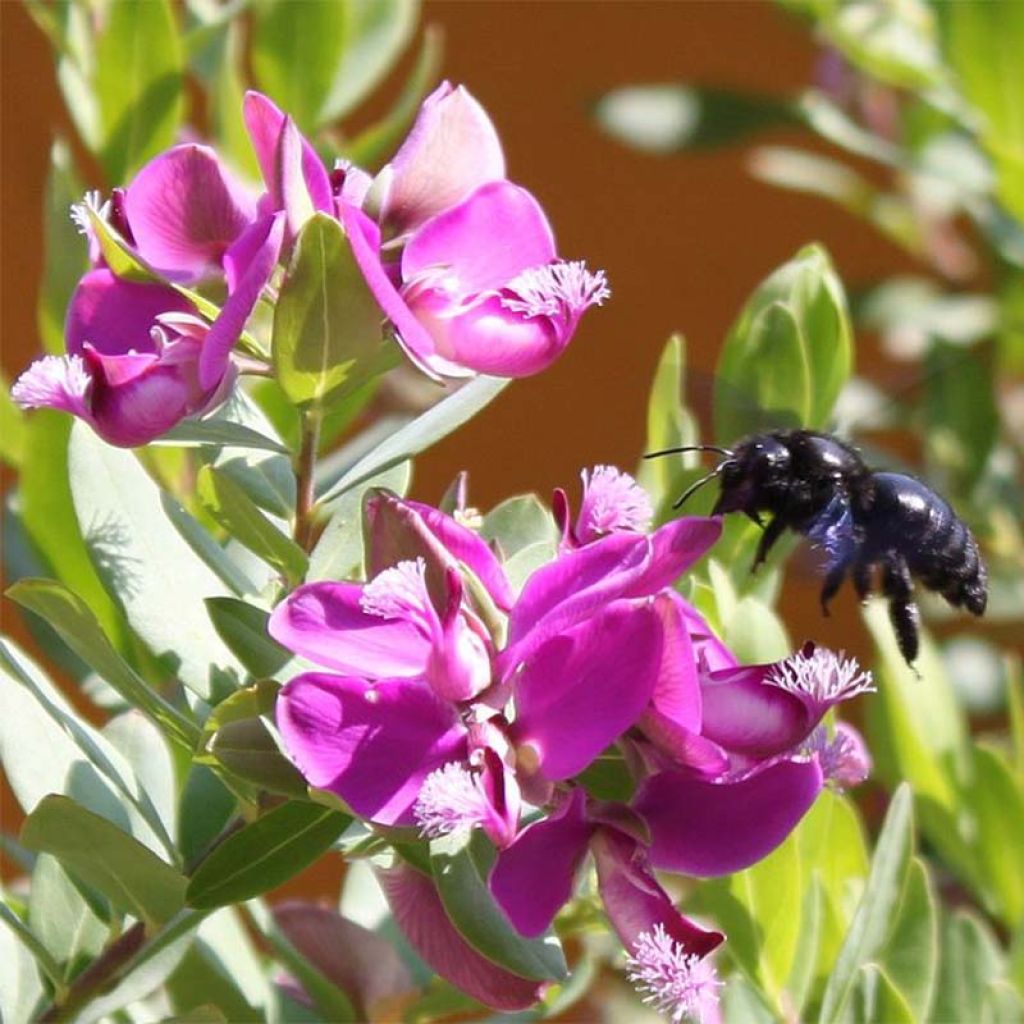

Polygala myrtifolia
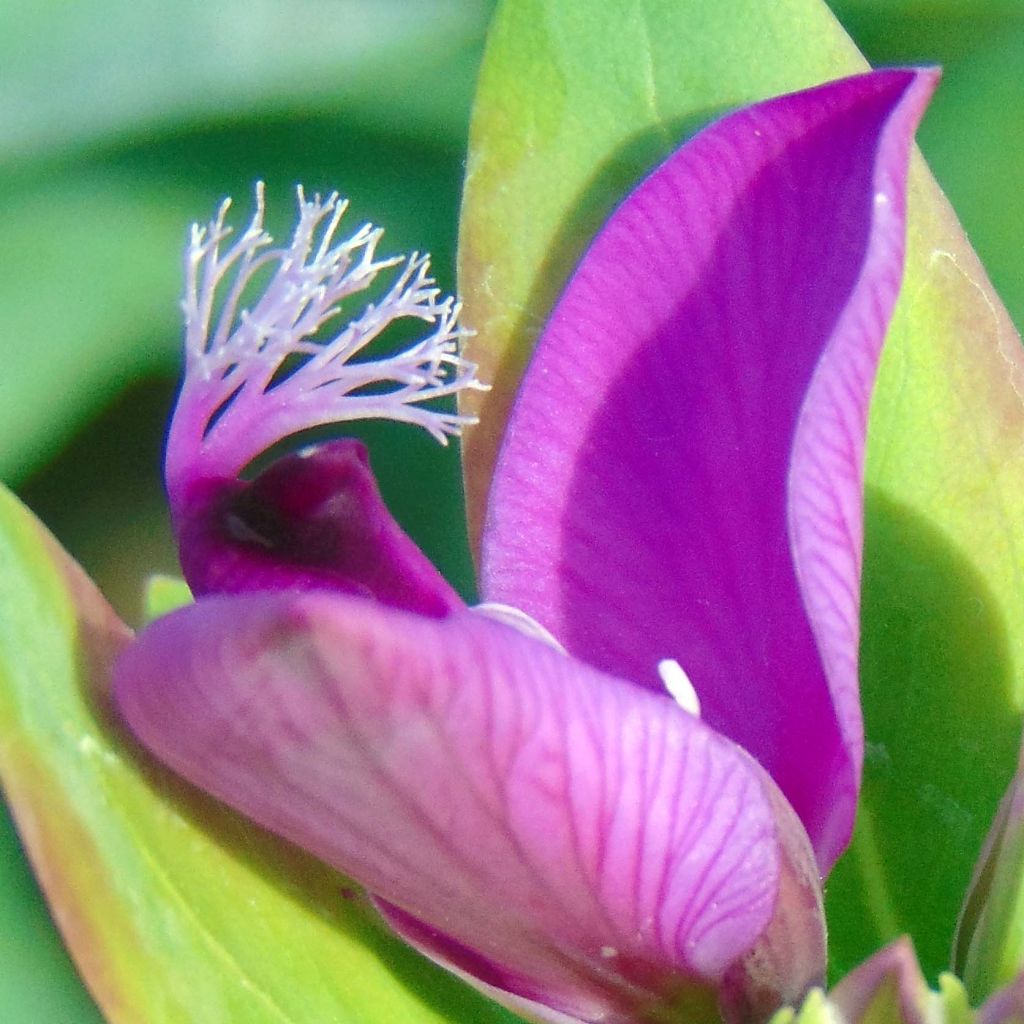

Polygala myrtifolia
View more pictures
Hide images
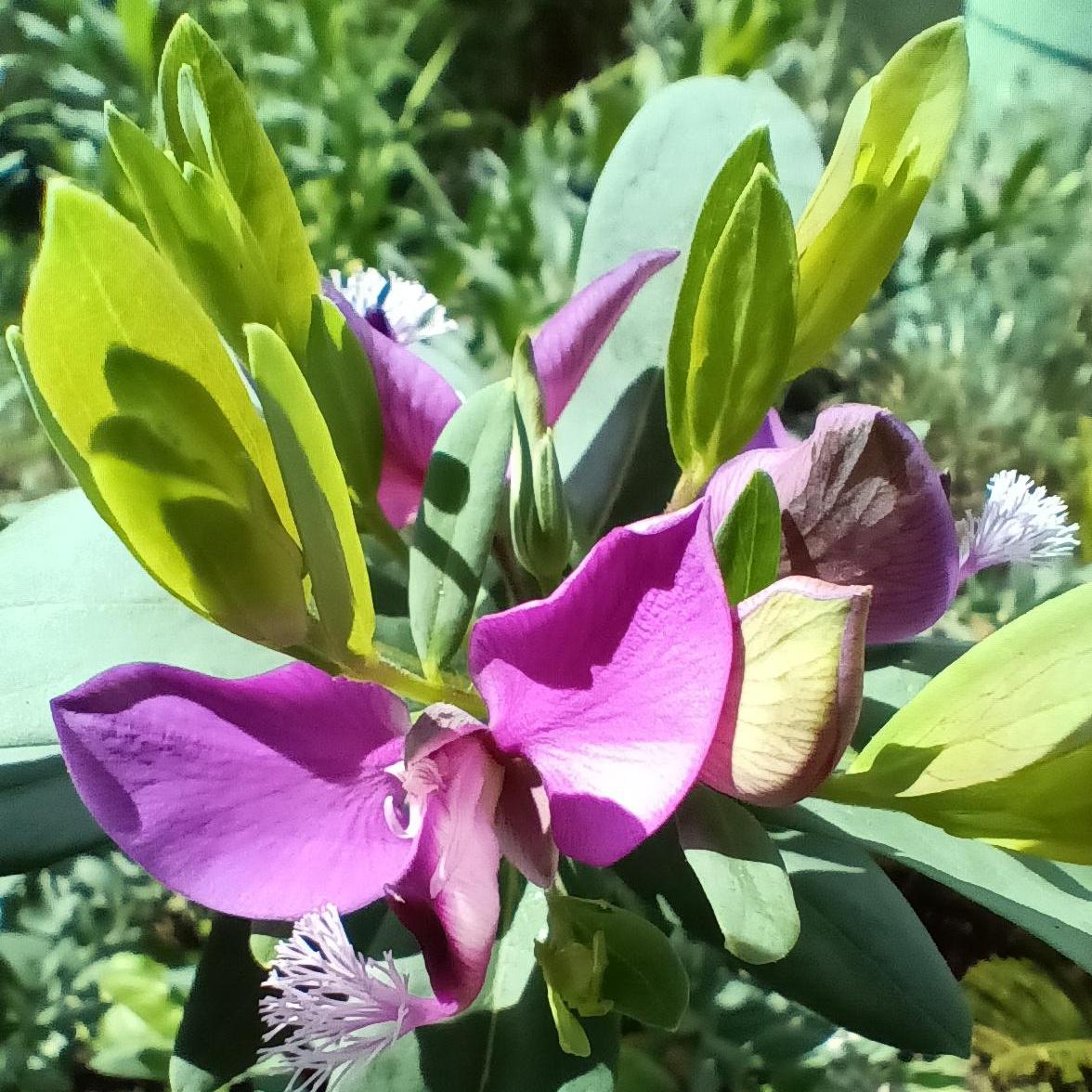
Delphine C.

Delphine C. • 85 FR
Polygala myrtifolia
Polygala myrtifolia
Sweet Pea Shrub, Myrtle-leaf Polygala
Since I've been ordering from Promesse de fleurs, I've never been disappointed. The polygala I received was already in flower, and its growth is magnificent. A site I'd recommend to all gardeners.
Gérard, 01/04/2025
Special offer!
Receive a €20 voucher for any order over €90 (excluding delivery costs, credit notes, and plastic-free options)!
1- Add your favorite plants to your cart.
2- Once you have reached €90, confirm your order (you can even choose the delivery date!).
3- As soon as your order is shipped, you will receive an email containing your voucher code, valid for 3 months (90 days).
Your voucher is unique and can only be used once, for any order with a minimum value of €20, excluding delivery costs.
Can be combined with other current offers, non-divisible and non-refundable.
Home or relay delivery (depending on size and destination)
Schedule delivery date,
and select date in basket
This plant carries a 24 months recovery warranty
More information
We guarantee the quality of our plants for a full growing cycle, and will replace at our expense any plant that fails to recover under normal climatic and planting conditions.


Would this plant suit my garden?
Set up your Plantfit profile →
Description
Polygala myrtifolia, also known as the Myrtle-leaf Milkwort, is undoubtedly the most widely planted species of Polygala in our gardens in very mild climates, but also on our patios. Its popularity is due to its ease of cultivation, its hardiness, but also to its remarkable number of flowers and length of flowering. Its evergreen vegetation is light but dense, bushy and nicely rounded. In successive waves, it produces beautiful clusters of small bicolored pea flowers, white and pink-violet, sometimes all year round. An enjoyable bush from all points of view, essential in mild climates and by the seaside.
The Myrtle-leaf Milkwort is an evergreen shrub plant from the large family Polygalaceae, native to South Africa. Its natural environment, which is very variable, consists of different types of open areas, such as heathlands, cliffs, dunes, shrubland and even along streams. It forms a beautiful bush of 2m (7ft) in all directions within 3 to 4 years. While its growth is fast, its lifespan is limited. This Polygala, like many others, ensures its longevity by self-seeding, sometimes abundantly, in the most unexpected places in the garden, in favourable climates and soils. Its flowering is very vibrant, lasting about 10 months, from April-May to autumn. The flowers, gathered in terminal clusters, are papilionaceous like those of the legumes. They consist of 2 winged sepals in pink-violet and a lower petal in white-green strongly tinged with violet. The stamens emerge from the flower, forming a tuft of the same shade. The foliage is evergreen, with green or purplish branches. The small leaves are rounded to ovate, pointed at their tips, tender green and sometimes tinged with purple, 2 to 3cm (1in) long, with a more pronounced midrib. The fruit is a small winged capsule, sometimes difficult to spot on the bush.
This Polygala will find its place in small hedges, Mediterranean shrub beds, rockeries, in not too cold climates, in the company of Melaleuca, Leptospermum, Medicago arborea, evergreen Ceanothus, Abelia and Escallonia. It will withstand -5°C, in well-drained soil. Elsewhere, it can be displayed in large pots that can be brought indoors in winter to protect them from frost. It is content with ordinary but very well-drained soil and a sunny position. It is highly recommended for coastal gardens, as it is very tolerant of strong winds and soil and air salinity.
Report an error about the product description
Polygala myrtifolia in pictures
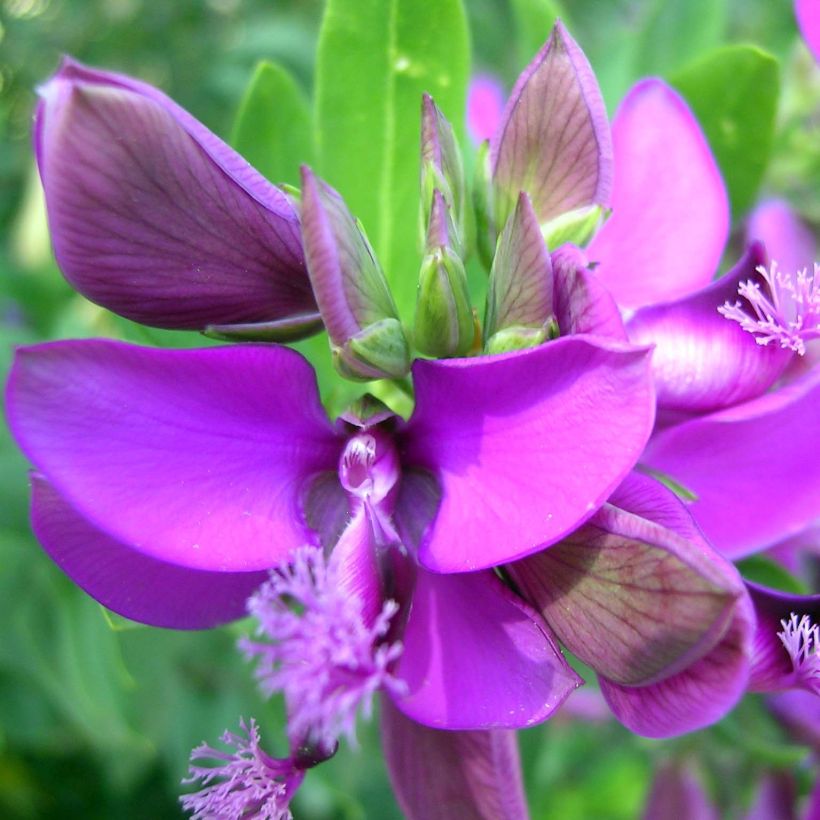

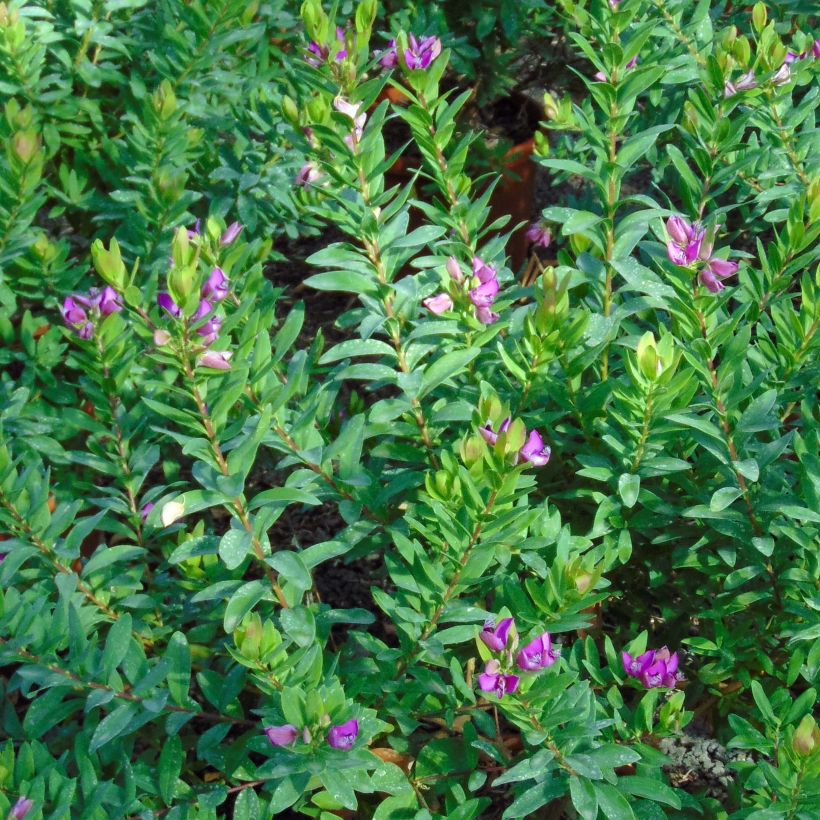

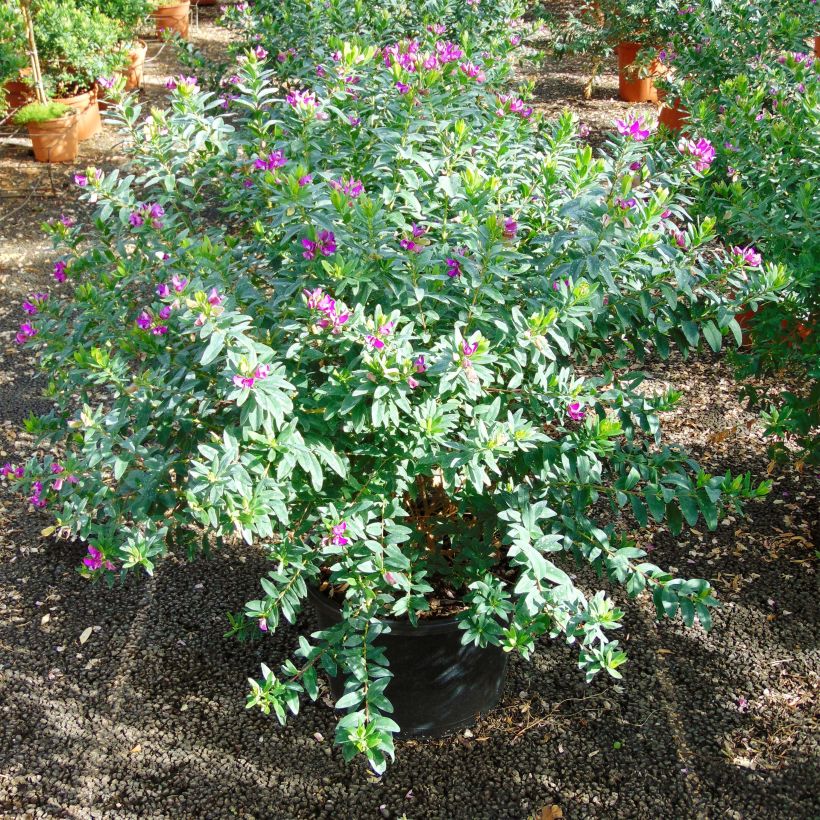

Plant habit
Flowering
Foliage
Botanical data
Polygala
myrtifolia
Polygalaceae
Sweet Pea Shrub, Myrtle-leaf Polygala
South Africa
Planting and care
Grow the myrtle-leaved Polygala in a beautiful ceramic pot or large container to enjoy its flowers on your balcony or patio. This plant, which is not very hardy, can only be grown in the ground in the mildest Mediterranean and coastal regions, where temperatures do not drop below -5°C (23°F). In a very sheltered position, it may be slightly hardier. In colder regions, growing it in a container allows the plant to overwinter in a bright, unheated, frost-free room. Winter protection fleece can increase hardiness for plants grown in the ground. Polygala prefers sunny locations and adapts to any soil, acidic, neutral, alkaline, moist or dry, as long as it is well-drained. Place a mixture of 1/3 garden soil, 1/3 compost, and 1/3 coarse sand or gravel in the planting hole or pot. It is preferable to water regularly during hot periods, but this plant, when grown in the ground, tolerates drought fairly well.
Propagation is easy by sowing the plant's own seeds, but sometimes they can be difficult to find on the bush.
Planting period
Intended location
Care
-
, onOrder confirmed
Reply from on Promesse de fleurs
Similar products
Haven't found what you were looking for?
Hardiness is the lowest winter temperature a plant can endure without suffering serious damage or even dying. However, hardiness is affected by location (a sheltered area, such as a patio), protection (winter cover) and soil type (hardiness is improved by well-drained soil).

Photo Sharing Terms & Conditions
In order to encourage gardeners to interact and share their experiences, Promesse de fleurs offers various media enabling content to be uploaded onto its Site - in particular via the ‘Photo sharing’ module.
The User agrees to refrain from:
- Posting any content that is illegal, prejudicial, insulting, racist, inciteful to hatred, revisionist, contrary to public decency, that infringes on privacy or on the privacy rights of third parties, in particular the publicity rights of persons and goods, intellectual property rights, or the right to privacy.
- Submitting content on behalf of a third party;
- Impersonate the identity of a third party and/or publish any personal information about a third party;
In general, the User undertakes to refrain from any unethical behaviour.
All Content (in particular text, comments, files, images, photos, videos, creative works, etc.), which may be subject to property or intellectual property rights, image or other private rights, shall remain the property of the User, subject to the limited rights granted by the terms of the licence granted by Promesse de fleurs as stated below. Users are at liberty to publish or not to publish such Content on the Site, notably via the ‘Photo Sharing’ facility, and accept that this Content shall be made public and freely accessible, notably on the Internet.
Users further acknowledge, undertake to have ,and guarantee that they hold all necessary rights and permissions to publish such material on the Site, in particular with regard to the legislation in force pertaining to any privacy, property, intellectual property, image, or contractual rights, or rights of any other nature. By publishing such Content on the Site, Users acknowledge accepting full liability as publishers of the Content within the meaning of the law, and grant Promesse de fleurs, free of charge, an inclusive, worldwide licence for the said Content for the entire duration of its publication, including all reproduction, representation, up/downloading, displaying, performing, transmission, and storage rights.
Users also grant permission for their name to be linked to the Content and accept that this link may not always be made available.
By engaging in posting material, Users consent to their Content becoming automatically accessible on the Internet, in particular on other sites and/or blogs and/or web pages of the Promesse de fleurs site, including in particular social pages and the Promesse de fleurs catalogue.
Users may secure the removal of entrusted content free of charge by issuing a simple request via our contact form.
The flowering period indicated on our website applies to countries and regions located in USDA zone 8 (France, the United Kingdom, Ireland, the Netherlands, etc.)
It will vary according to where you live:
- In zones 9 to 10 (Italy, Spain, Greece, etc.), flowering will occur about 2 to 4 weeks earlier.
- In zones 6 to 7 (Germany, Poland, Slovenia, and lower mountainous regions), flowering will be delayed by 2 to 3 weeks.
- In zone 5 (Central Europe, Scandinavia), blooming will be delayed by 3 to 5 weeks.
In temperate climates, pruning of spring-flowering shrubs (forsythia, spireas, etc.) should be done just after flowering.
Pruning of summer-flowering shrubs (Indian Lilac, Perovskia, etc.) can be done in winter or spring.
In cold regions as well as with frost-sensitive plants, avoid pruning too early when severe frosts may still occur.
The planting period indicated on our website applies to countries and regions located in USDA zone 8 (France, United Kingdom, Ireland, Netherlands).
It will vary according to where you live:
- In Mediterranean zones (Marseille, Madrid, Milan, etc.), autumn and winter are the best planting periods.
- In continental zones (Strasbourg, Munich, Vienna, etc.), delay planting by 2 to 3 weeks in spring and bring it forward by 2 to 4 weeks in autumn.
- In mountainous regions (the Alps, Pyrenees, Carpathians, etc.), it is best to plant in late spring (May-June) or late summer (August-September).
The harvesting period indicated on our website applies to countries and regions in USDA zone 8 (France, England, Ireland, the Netherlands).
In colder areas (Scandinavia, Poland, Austria...) fruit and vegetable harvests are likely to be delayed by 3-4 weeks.
In warmer areas (Italy, Spain, Greece, etc.), harvesting will probably take place earlier, depending on weather conditions.
The sowing periods indicated on our website apply to countries and regions within USDA Zone 8 (France, UK, Ireland, Netherlands).
In colder areas (Scandinavia, Poland, Austria...), delay any outdoor sowing by 3-4 weeks, or sow under glass.
In warmer climes (Italy, Spain, Greece, etc.), bring outdoor sowing forward by a few weeks.


































